Bibliography
Early poker literature tried to establish firm rules for the game. Unlike other card games in being a uniquely dynamic game (a competitive money-management game rather than a routine card game), poker could never be bound in rigid rules. Continuously changing within a loose framework of traditions, poker remained a versatile, living game always subject to modifications and variations (over 150 varieties of poker are described in the literature). As early as 1674, Cotton’s Complete Gamester’s (published in England) described a card game called Post and Pair, a predecessor to Bragg, which, in turn, was a predecessor to poker with a full deck. Bragg and the art of bluffing were first described in Cotton’s 1721 edition. Poque, a French card game that directly influenced the development of poker, was described in the eighteenth-century editions of Acadence Universelle des Jeux.
Until 1850, there were no printed rules for poker.47 Neither of the two American Hoyles then in print (George Long, New York, 1825, and G. Cowperthwait, Philadelphia, 1838) mentioned poker. The English Hoyle (Bohn’s Handbook of Games) made no reference to poker in either its 1850 or its 1887 edition. But the 1850 American reprint of Bohn’s book mentioned poker in an addendum. Also in 1850, Hoyles’ Games (H. F. Anners, Philadelphia) had a brief note about poker that described a full deck, ten players (therefore, no draw), and a bonus paid for any hand of trips or better. In 1857, Thomas Frere’s Hoyle (T. W. Story, New York) described poker without referring to a draw.
_______________________
47The common reference “poker according to Hoyle” is curious because the English writer and lawyer, Edmund Hoyle (1672-1769), never heard of poker: he died sixty years before the game originated. Hoyle was a famous whist player. His original book described three card games—whist, piquete and quadrille. But his authority for cardgame rules grew until all card and board game rules became known as “Hoyles.” Since many different “Hoyles” now exist, “poker according to Hoyle” depends on the editor and publisher of that particular Hoyle.
The first mention of draw poker appeared in the 1867 edition of Hoyles (Dick and Fitzgerald, New York). Also, that edition was the first book to mention an ante, a straight (which beat two pair, but not trips), and the straight flush (which beat four of a kind). The 1875 edition of Hoyles (Dick and Fitzgerald, New York) mentioned jackpot poker and the joker used as a wild card.
The first printed poker rules in England were written by General Robert E. Schenck, the United States minister to England. He introduced poker to the guests at a country house in Somersetshire. The hostess, a prominent duchess, persuaded him to write down the rules. In 1872, the duchess privately printed those rules for her court. The game caught Queen Victoria’s fancy, and the popularity of poker spread through Great Britain. Poker in England soon became known as “Schenck poker,”
In 1875, a description of poker appeared in Cavendish’s Round Games of Cards (De La Rue & Co.).
After 1875, books about poker appeared regularly in America, England, and Continental Europe. Data on all poker books (whose locations and dates of publication are known) published in the one hundred years between 1875 and 1975 have been tabulated below.
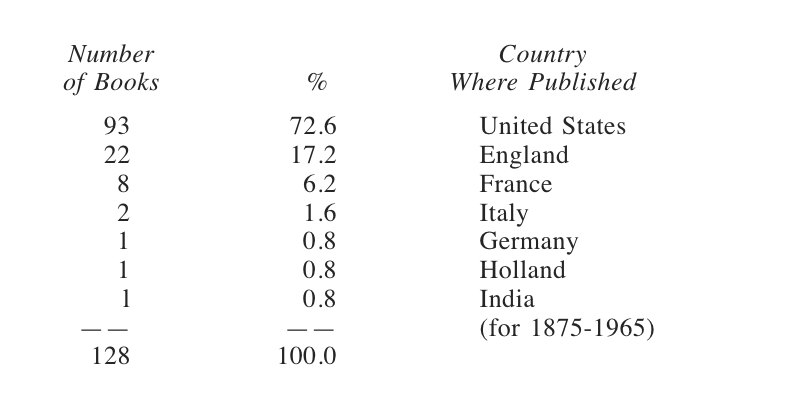
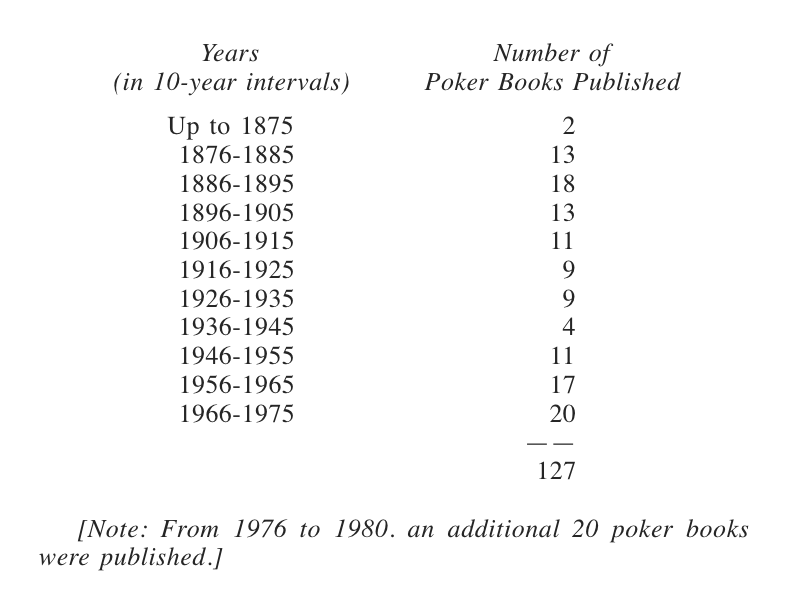
The Addendum Bibliography at the end of this Appendix B reviews each poker book published since 1968.
A bibliography of all known poker books is tabulated below:
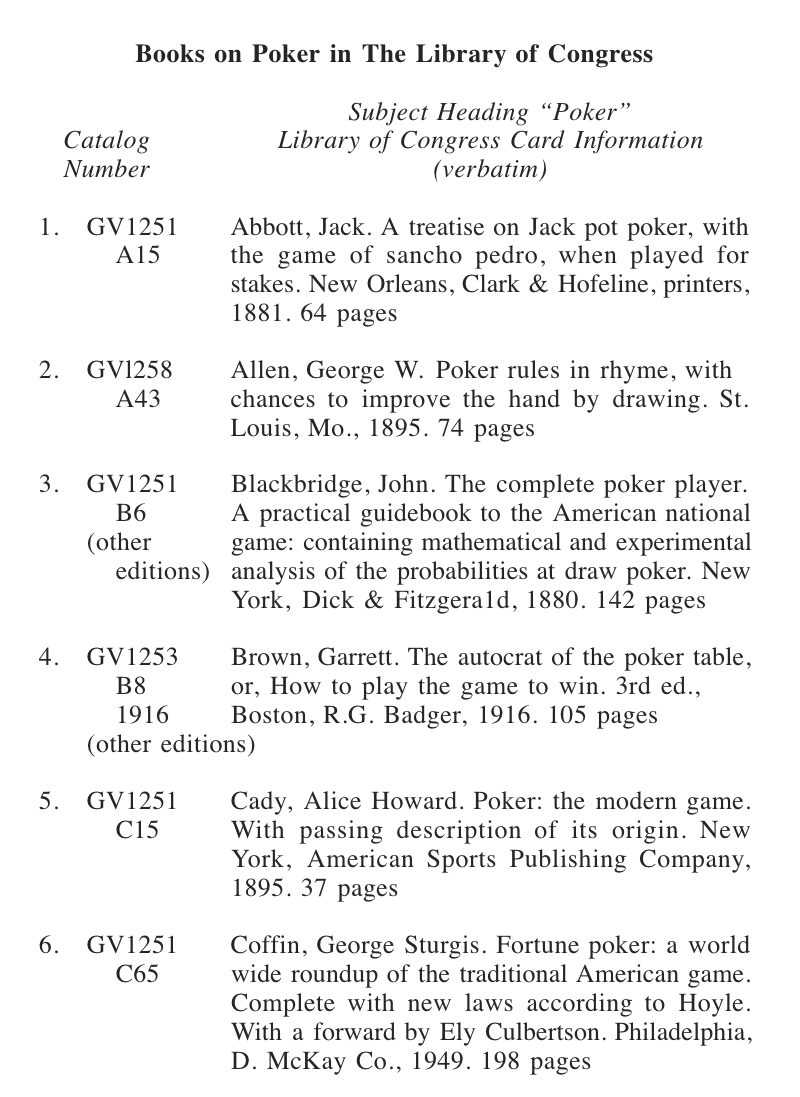
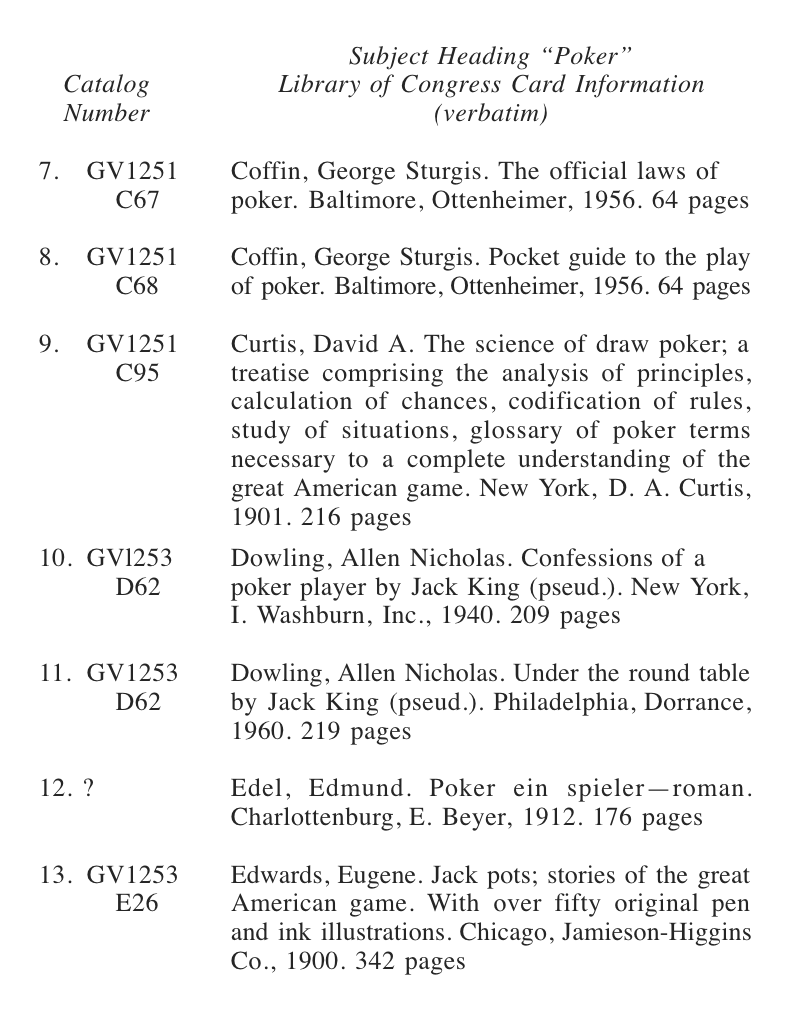
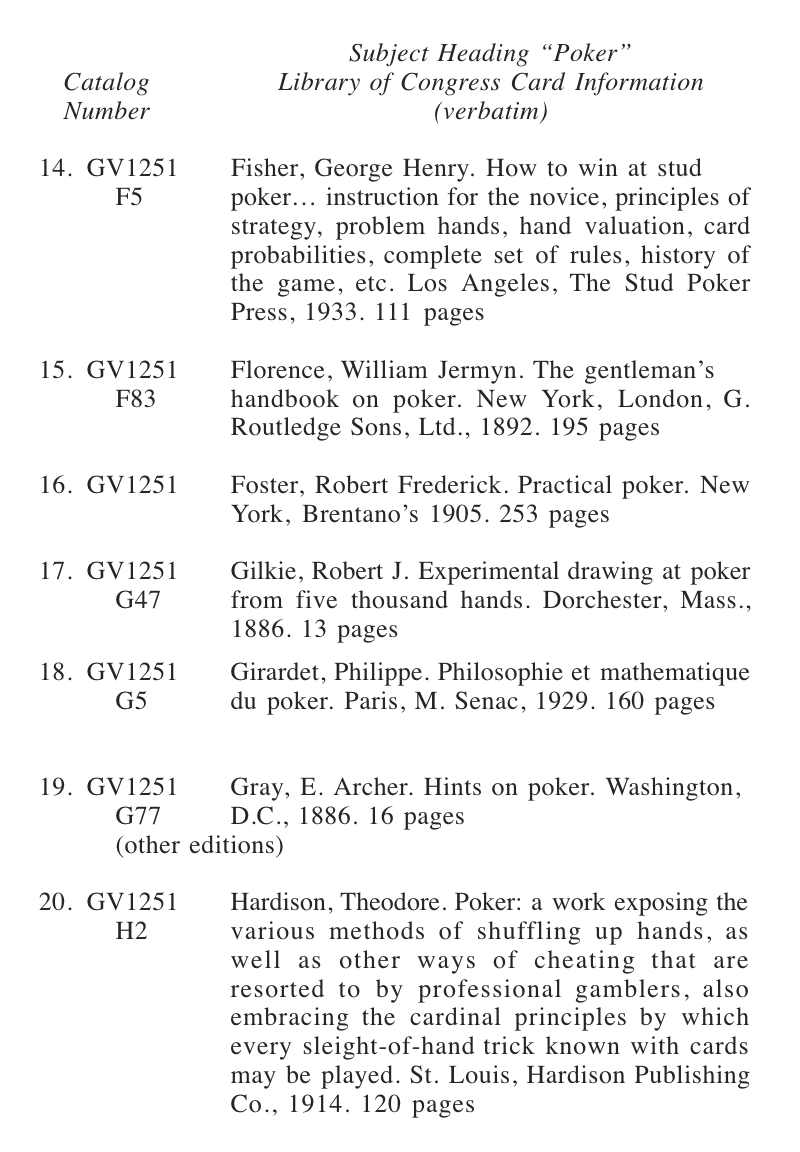
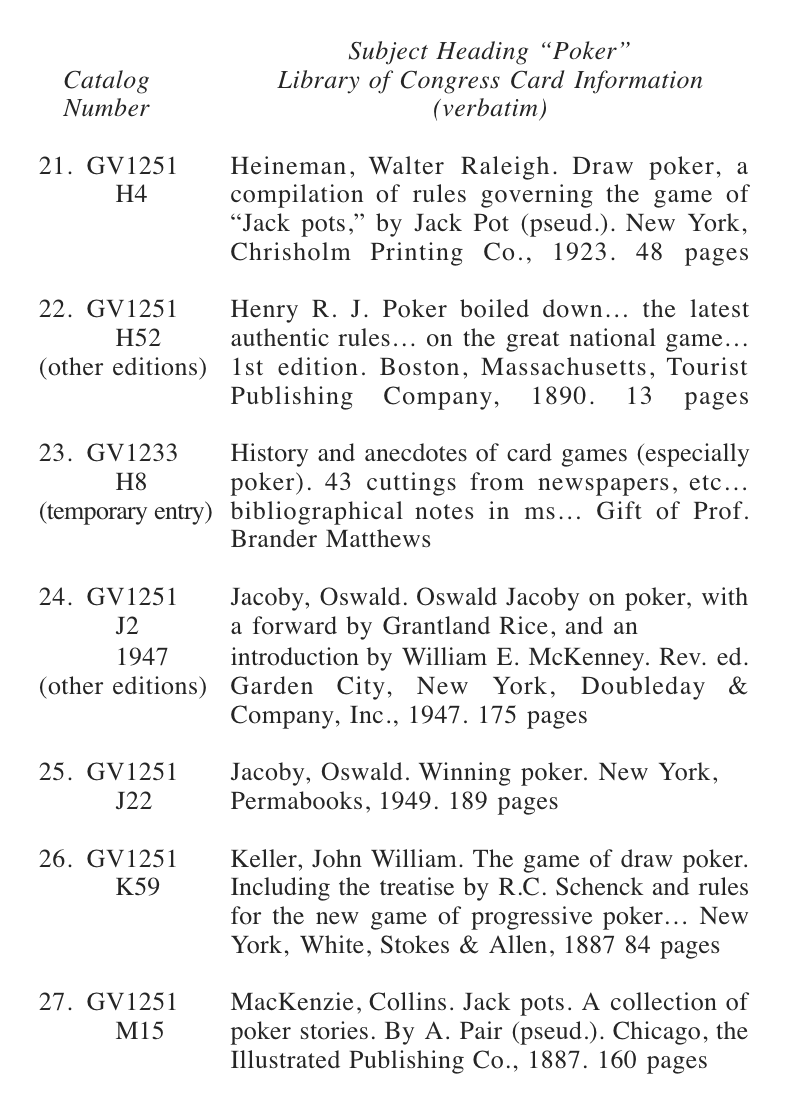
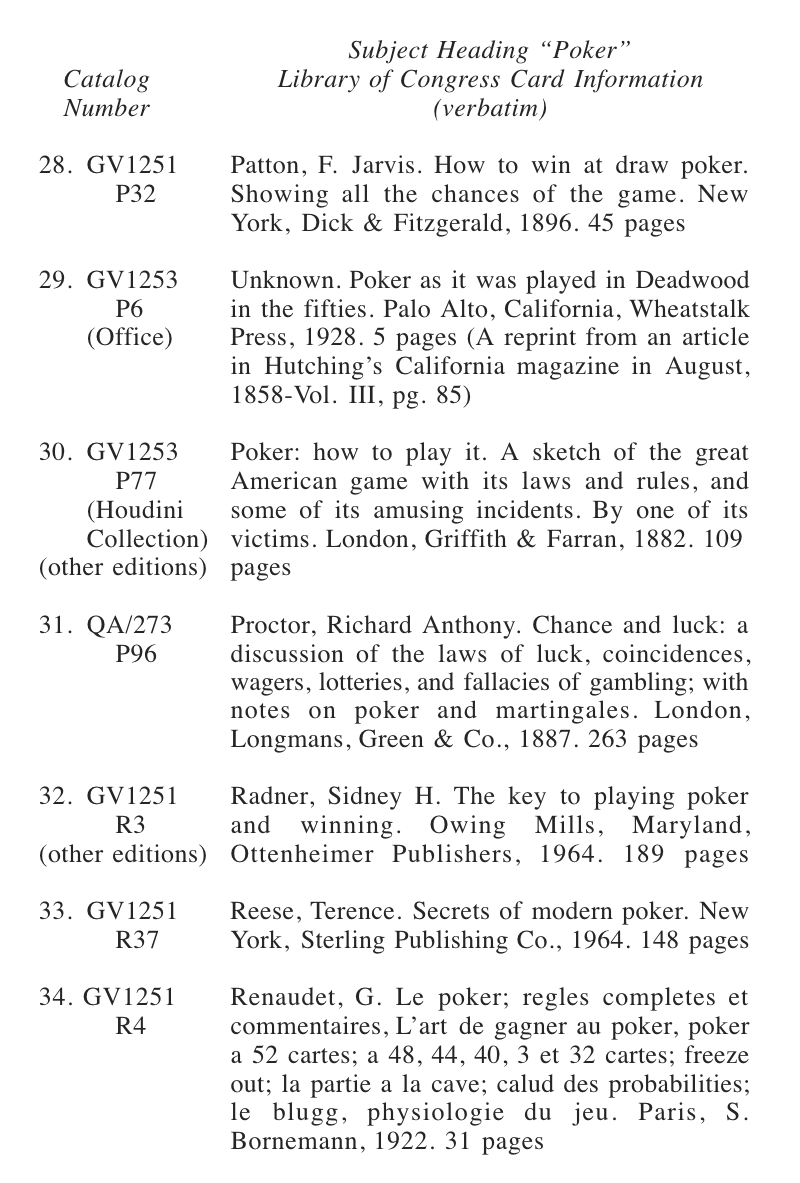
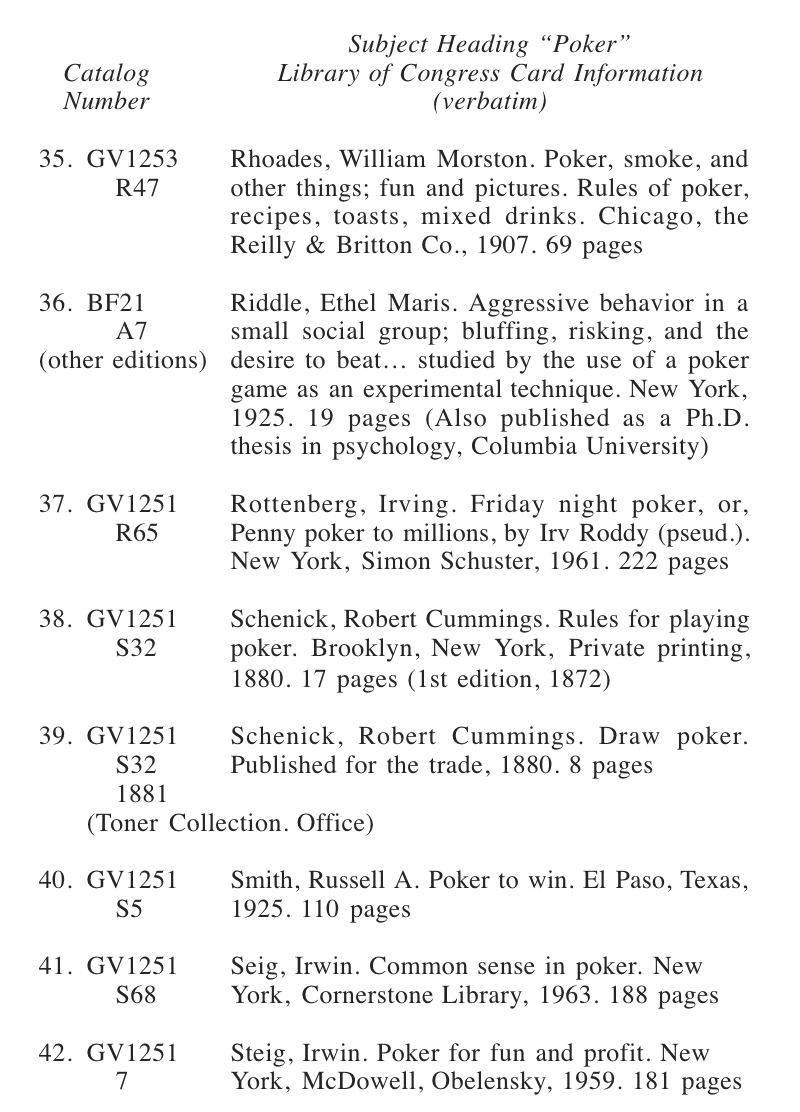
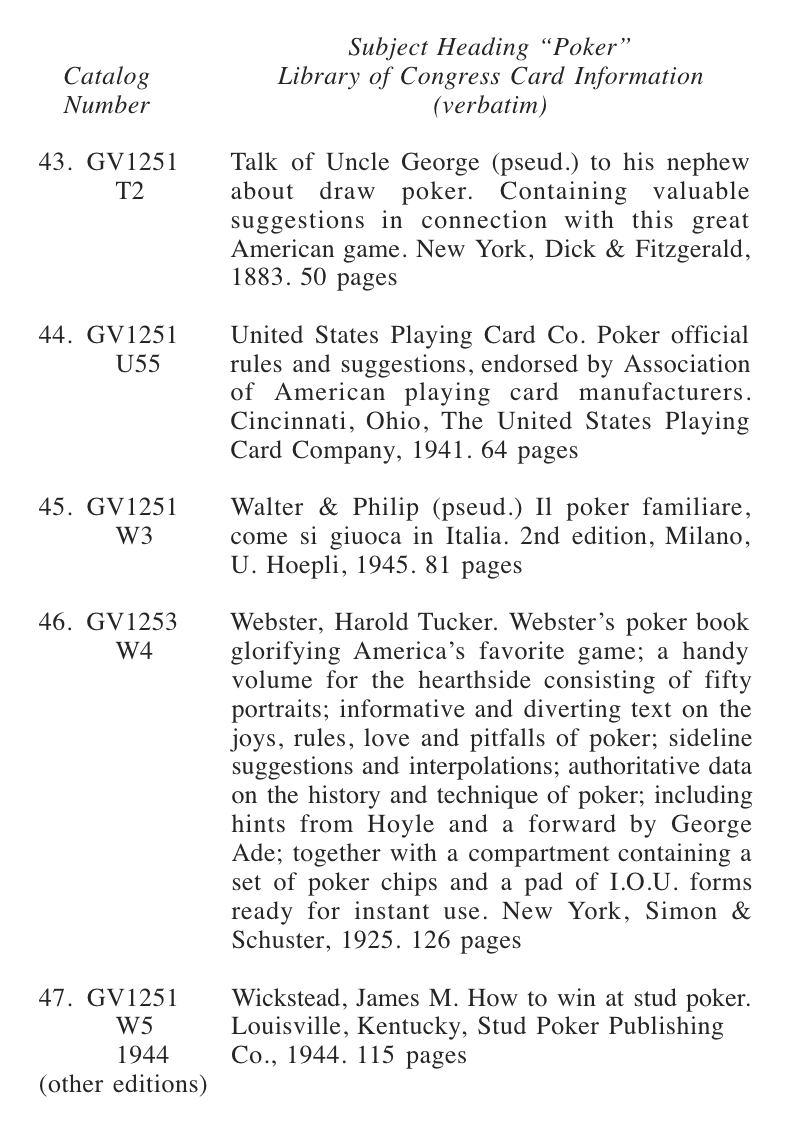
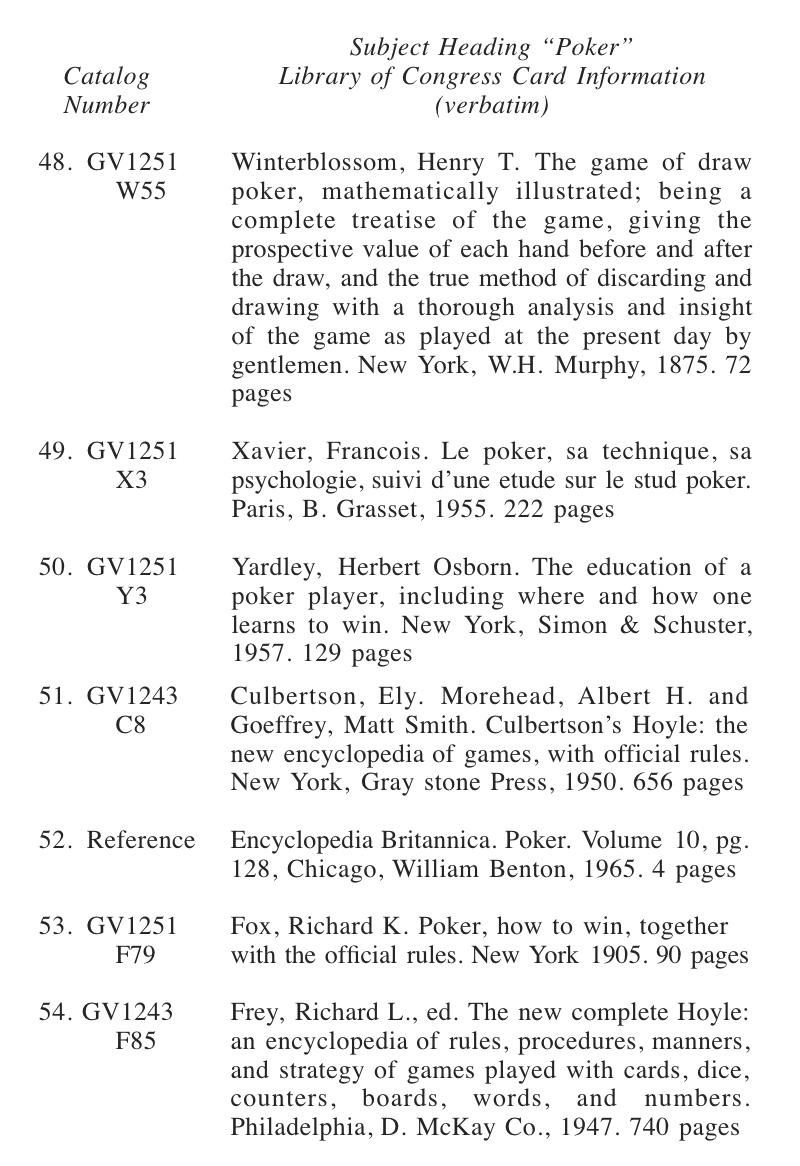
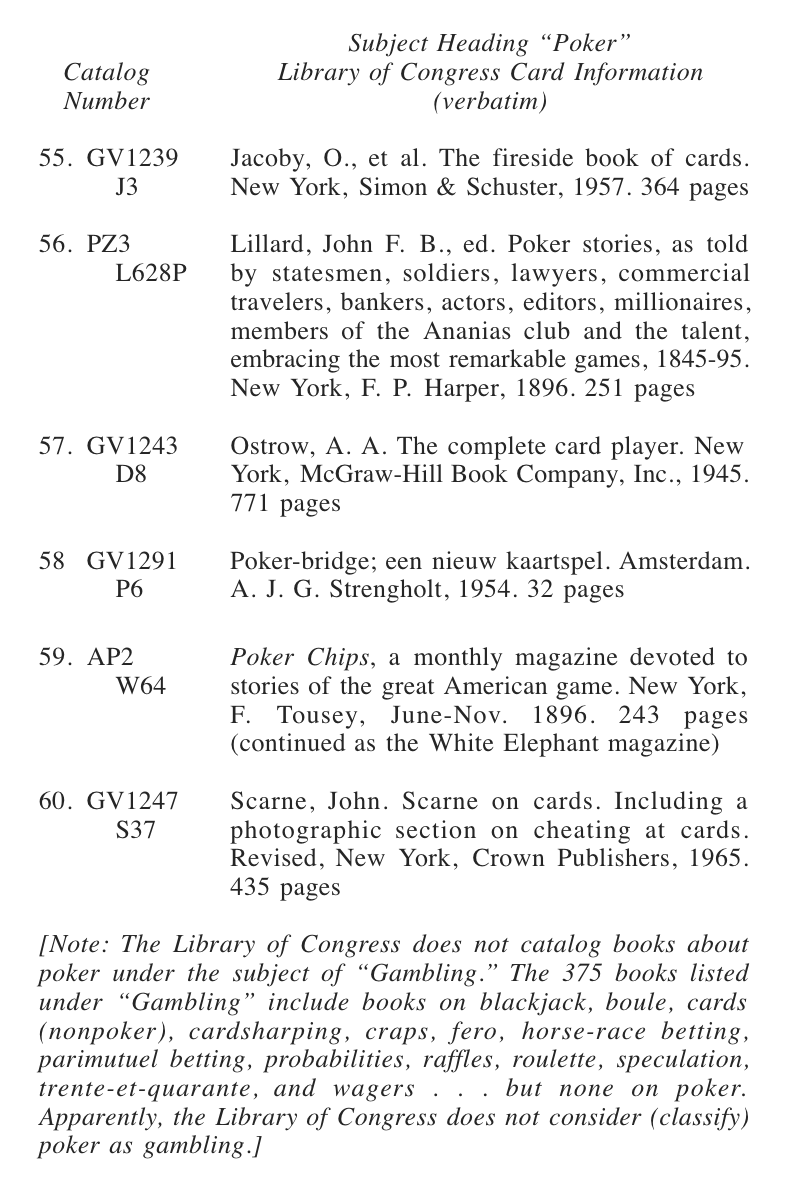
Seventy-two other poker books not found in the Library of Congress are listed below:
- Allan, L., The Laws of Poker, Mudie, 1929.
- Ankeny, Nesmith, Scientific Poker, Harper, 1967.
- Ante—I Raise You Ten, Jamieson-Higgans.
- Arnold, F. and Johnston, H., Poker, Routledge, 1929.
- Bergholt, E. G. B., Poker, De La Rue.
- Browning, H. S., Royal Auction Bridge and Poker, Routledge, 1920.
- Carcini, Nick, A Course in Professional Poker Playing, Memphis, Tennessee, Edall Publishing Co., 1965.
- Carleton, Henry Guy, Thompson Street Poker Club, Dick & Fitzgerald, 1888.
- Coffin, G. S., Poker Game Complete, Faber and Faber, 1950.
- Coffin, G. S., Complete Poker Game, Wehman.
- Crafton, A., Poker: Its Laws and Principles, Wyeil, 1915.
- Crawford, John R., How to be a Consistent Winner Most Popular Card Games, New York, Doubleday, 1953.
- Curtis, D. H., Queer Luck, New York, Brentano’s, 1900.
- Dalton, W., Pocket Guide to Poker Patience, De La Rue, 1909.
- Davis, A. D., An Analysis of Five and Seven Card Poker, Philadelphia, 1959 (Mimeographed Master’s Thesis).
- Debebian, D., Game of Poker, New York, 1889.
- Decisions on Moot Points of Draw Poker, New York.
- Diehl, Charles Vidol, Poker Patience and Progressive Poker Patience, London, The Advanced Publishing Co., 1909.
- Draw Poker, Dick.
- Draw Poker, Fitzgerald Publishing Corporation.
- Draw Poker, London, i884,63 pages.
- Draw Poker and Spoil Five, London, Routledge & Sons, 1884.
- Ellinger, M., Poker, Faber, 1934.
- Erdnase, S. W., The Expert at the Card Table, London, Stationers’ Hall, 1902.
- Fisher, G. G., Stud Poker Blue Book, Los Angeles, Stud Poker Press, 1934.
- Football Poker, Brentano’s.
- Foster, J. H., Traite de Jeu de Poker, Paris, 1889.
- Foster, R. F., Pocket Laws of Poker, De La Rue, 1910.
- Gilbert, Kenneth, Alaskan Poker Stories, Seattle, R. D. Seal,1958.
- Guerndale, Richard, Draw Poker without a Master, Dillingham.
- Guerndale, Richard, The Poker Book, London, I. Upcott Gill, 1889.
- Habeythe, Jeu de Poker, Paris, 1886
- Hirst, E. deF., Poker as Played by Skilled Professional Gamblers, 2nd ed., 1902.
- Hoffman, W., Draw Poker, the Standard Game. Dutton, 1913.
- How to Play Poker, Wehman Bros.
- How to Win at Draw Poker, Dick.
- How to Win at Draw Poker, Westbrook.
- Hoyle (pseud.), How to Play Poker, Ogilvie, 1916.
- Jackpot, Poker-Patience, International Card Co., 1909.
- Lamenti, C. E., Il Poker, Milano, A. Corticelli, 1929.
- La Shelle, Kirbe, Poker Rubaiyat, Phoenix, Arizona, Bunder Log Press, 1903.
- Laugher, A. B., Poker, C. Goodall, 1913.
- Laugher, A. B., Poker, London, 1889.
- Laun, Jeu de Poker, Paris, Watilliaux, 1897.
- Major, The Poker Primer, New York, 1886.
- Matthews, J. B., “Poker Talk” (p. 187 of Penn and Ink), New York, Longmans, Green & Co., 1888.
- Meehan, C. H. W., The Rules for Playing Draw Poker (Game of Euchre), Philadelphia, T. B. Peterson, 1877.
- Morehead, Albert Hodges, New Complete Hoyle, Toronto, Doubleday, 1956.
- Morehead, Albert Hodges, My Secret: How to Play Winning Poker, Los Angeles, W.R. Mathews and Sons, 1957.
- Morehead, Albert Hodges, The Complete Guide to Winning Poker, New York, Simon and Schuster, 1967.
- Moss, John (pseud. for Jack Potter), How to Win at Poker, Doubleday, 1955.
- Mott, Street Poker Club, Dick.
- Nabot, Jeu de Poker, Paris, Henri Gautier, 1893 (contains many probability tables).
- Pardon, C.F. (Raudon Crawley), Poker, London, Chas. Goodhall & Sons, 1889.
- Percy, Alfred, Poker: Its Laws and Practice, Allahabad, India, Pioneer Press, 1879.
- Phillips, Hubert, Profitable Poker, Arco Publications, 1960.
- Philpots, E. P., A Treatise on Poker, London, 1904.
- Poker: The Nation’s Most Fascinating Card Game, Cincinnati, United States Playing Card Company, 1950.
- Poker, Heines Publishing Co., Inc., Minneapolis, Minnesota.
- Poker, How to Play It, London, 1882.
- Poker Primer, Platt & Nourse.
- Potter, Jack, How to Win at Poker, Garden City Books, 1955.
- Primer, Excelsior.
- Proctor, R. A., Poker Principles and Chance Laws, New York, Dick & Fitzgerald, 1883.
- Rander, S. H., How to Play Poker and Win (Key), Assoc. Booksellers, 19B5.
- Reese, Terence, and Watkins, Anthony, Poker: Game of Skill, Wehman, 1962.
- Reynolds, A., Poker Probabilities Calculated, Sheffield, 1901.
- Rules of Poker, London, 1882.
- Sinclair, E., Poker, Arco Publications, Ambassador, 1964.
- Strong, Julian, How to Play Poker, London, New York, W. Foulsham, 1928.
- “Templar,” Poker Manual, Warne.
- Welsh, Charles, Poker: How to Play It, London, Griffith & Farren, 1882.
- Virt, L. H., Traite’ Complet du Jeu de Poker, Paris, 1913 (contains only rules).
Addendum Bibliography of Poker Books Published
since 1968
(through 1980):
- Anno, James N., An Encyclopedia of Draw Poker, New York, Exposition, 1973. Shows mathematical calculations of various poker odds and probabilities. Some errors. Not much value. Interesting history of poker.
- Anthony, Ross, Get Rich Playing Poker, Birmingham, Alabama, RAM Enterprises, 1975. Author is objective and honest. Valid advice for low-stake games with poor players. Good tips for running profitable house games.
- Brunson, Doyle, How I Made Over $1,000,000 Playing Poker, Las Vegas, Nevada, B & G Publishing Co., 1978. A monumental work on public professional poker. Reveals not only the strengths and secrets of the best traditional professionals in public poker, but their flaws and weaknesses that will allow any Advanced-Concept player to beat them.
- Caro, Mike, Bobby Baldwin’s Winning Poker Secrets, Las Vegas, Nevada. B & G Publishing Co., 1979. Mainly a fictionalized, biography that is embarrassingly personal and rather ludicrous, but provides a useful list of poker tips for various games.
- Castle, J. L.. How Not to Lose at Poker, Boston, Little, Brown and Company, 1970. Perpetuates many of the erroneous clichés about poker. Goes deep into probability mathematics. Little value.
- Dangel, Philip N., Poker Poker, Las Vegas, Nevada, Gambler’s Book Club, 1977. Little new information. Mainly theoretical and mathematical. An unrealistic approach to poker.
- Dowling, Allan (“Jack King”), Play Winning Poker, Las Vegas, Nevada, Gambler’s Book Club, 1974. Good history of poker. Some interesting observations about opponents and table-stake games. But littered with fallacies.
- Fox, John, Play Poker, Quit Work, and Sleep Till Noon, Seal Beach, California, Bacchus Press, 1977. Poorly written. Borrows, uses, and distorts various Advanced Concepts of Poker. Contains some original and useful ideas about draw poker in public card clubs. Worthwhile for serious players who can sort the useful information from the misleading material.
- Gibson, Walter, Poker Is the Name of the Game, New York, Barnes & Noble, 1974. Instructions and “rules” for eighteen basic variations of poker. Little new or useful information. Some erroneous concepts.
- Hamilton, Mark, Poker Answers, Las Vegas, Nevada, I & O Publishing Company, 1978. An exclusive interview with Frank R. Wallace. 250 new questions about poker are answered.
- Jacoby, Oswald, Penny-Ante and Up, Garden City, New York, Doubleday & Company, Inc., 1979. Mostly rules for various poker games. Reveals such a naive and faulty understanding of poker that one wonders if someone other than Oswald Jacoby wrote this book.
- Livingston, A. D., Poker Strategy and Winning Play, Philadelphia, J. B. Lippincott Company, 1971. Little new information except for two tables of odds for hold ‘em poker.
- Montgomery, John, How to Play and Win at Poker, Santa Barbara, California, Cameron and Cameron Publishers, 1978. Little valuable information. Many erroneous concepts.
- Percy, George, 7-Card Stud, The Waiting Game, Las Vegas, Nevada, Gambler’s Book Club, 1979. Best primer available for seven-card stud. Well written and adopts many Advanced Concepts that apply to stud. A few errors. Helpful section on casino poker.
- Preston, Thomas Austin (“Amarillo Slim”), Play Poker to Win, New York, Grosset & Dunlap, 1973. Interesting poker anecdotes. Some useful tips about hold ‘em and lowball.
- Rubins, J., Win at Poker, New York, Funk & Wagnalls, 1968. Well written, but based on many of the fallacious concepts advanced by other poker books.
- Scarne, John, Scarne’s Guide to Modern Poker, New York Simon & Schuster, 1979. Nothing new. Repeats old errors, but still useful to read.
- Silberstang, Edwin, Winning Poker Strategy, New York, David McKay Co., Inc., 1978. The best primer on poker. Few errors. Recommended for all beginners and losers.
- Sklansky, David, Hold ‘em Poker, Las Vegas, Nevada, Gambler’s Book Club, 1978. The first book to offer detailed information about hold ‘em poker. Some errors.
- Sklansky, David, Poker Theory, Las Vegas, Nevada, Gambler’s Book Club, 1978. A recasting of certain Advanced Concepts into theoretical forms that are often impractical or flawed. Some value. Interesting gametheory chapter.
- Sklansky, David, Sklansky on Razz, Las Vegas, Nevada, Gambler’s Book Club, 1980. Some new and useful information on Razz (seven-card-stud lowball) that is not covered in other books.
- Smith, Al, Poker to Win, Las Vegas, Nevada, Gambler’s Book Club, 1975. Good outline of cheating techniques used in poker. But presents many erroneous views about poker.
- Smith, Brian, Pineapple Hold ‘em, Las Vegas, Nevada, Gambler’s Book Club, 1979. The only book dealing with pineapple hold ‘em (players receive three hole cards and then discard one). A valuable book that reflects a good understanding of poker.
- Spanier, David, Total Poker, New York, Simon and Schuster, 1977. Mainly history and anecdotes about poker. Devotes a dozen pages to the Advanced Concepts of Poker. Interesting reading, but not a how-to-play book.
- Taetazsch, L., Winning Methods of Bluffing and Betting in Poker, New York, Drake Publishers, 1976. Limited value. Uses some of the Advanced Concepts of Poker.
- Thackrey, Ted, Jr., Dealer’s Choice, Chicago, Henry Regnery Co. 1971. Fairly well organized. Some valid ideas about elementary poker strategy. Other ideas are in error.
- Wagner, W., To Gamble or Not to Gamble, New York, World Publishing, 1972. Interesting anecdotes and facts about casino, club, and private poker. Spoiled by unsubstantiated assertions and false conclusions.
- F. R., Hamilton, M. and William S., Neocheating— The Unbeatable Weapon in Poker, Blackjack, Bridge, and Gin, Las Vegas, I & O Publishing Company, Inc., 1980. A definitive treatment of Neocheating in poker.
- Wallace, Frank R., Poker, A Guaranteed Income for Life by Using the Advanced Concepts of Poker, Las Vegas, I & O Publishing Company, Inc., l968-1976. New York, Crown Publishers, Inc., 1977. Warner Books, 1980, paperback.
- Wallace, Frank R., An Obituary for the Public Professional Poker Player, Las Vegas, Nevada, I & O Publishing Company, Inc., 1979. A special report showing how the Advanced-Concept player can bankrupt today’s public poker professionals.
- Wallace, Frank R., Poker Power. To be published in 1981.
- Wallace, Frank R., and Savage, Eric, Poker Troubleshooting Guide and Answer Book. To be published in 1980.
- Winfield, T. D., If You Are Going to Play Poker . . . Win, McLean, Virginia, the Kingsway Company, 1971. Some practical information, but laced with fallacious clichÈ’s about poker.
- Zachary, Hugh, Wild-Card Poker, Brattleboro, Vermont, Stephen Greene Press, 1975. Recognizes the added skill needed to play wild-card games. Little new information.
Contains erroneous concepts. - Zadek, Norman, Winning Poker Systems, Englewood Cliffs, New Jersey, Prentice-Hall, 1974. Heavily oriented to a mathematical approach. Interesting and moderately useful, but not a valid approach to poker.
- Zahrobsky, Robert F., The Computer Guide to Hold ‘em Poker, Las Vegas, 1979. A misleading emphasis on mathematics. Still worthwhile—some unique and interesting tables of data for hold ‘em percentages. Almost nothing on strategy and other crucial aspects of poker.
Notes:
- The most complete source of poker and gambling books(both in and out of print) is Gambler’s Book Club, 630 South 11th Street, Dept. PB, Las Vegas, Nevada 89101. A free catalog listing over 700 titles on poker and gambling is available.
- The University of Nevada (Las Vegas) library has a special collection of nearly 2000 gaming books, including more than 83 different titles on poker. Many historic poker books were donated by I&O Publishing Company.